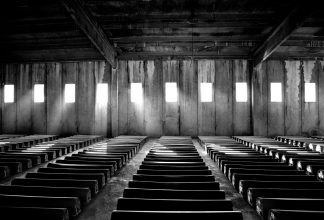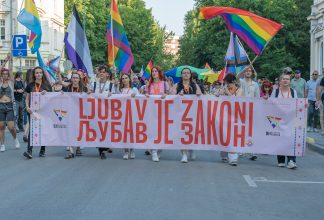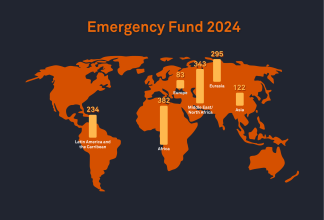Police Protected Pride Participants
A Pride parade was held today, for the first time ever in Serbia. This is a great step forward for the rights of Lesbian, Gay, Bisexual and Transgendered (LGBT) people. However, great efforts from authorities and police where required in order to guarantee security for the participants. It has been reported that groups demonstrating against the Pride parade injured several policemen, but that these demonstrators did not manage to get through to the parade itself.
“The authorities have done their utmost to protect LGBT people’s right to demonstrate peacefully and to move freely on the streets of Belgrade,” says Robert Hårdh, Executive Director of Civil Rights Defenders, who participated in the parade. It is a very positive and important signal that the rights of LGBT persons are taken seriously and that threats and violence against this community are not tolerated.
An estimated number of 1200 people gathered this morning to take part in the parade, which was a peaceful demonstration for the rights of LGBT people. Except from large parts of the LGBT community in Serbia, representatives from ministries and the parliament were among the participants, as well as representatives of international organisations and embassies. Around 5.000 – 6.000 policemen were protecting the event and parts of the city had been closed for traffic since last night.
Two earlier attempts to organise Pride in Belgrade have been made. The one in 2001 ended with violence against the participants, while the one in 2009 had to be cancelled in the last minute since the police assessed that it could not guarantee the security of the participants. This year’s Pride, as well as the other two attempts, was preceded by threats against the organisers and by strongly homophobic statements on Internet and on graffiti in some parts of Belgrade. Yesterday an anti-demonstration was organised in the city.
That today’s Pride could be realised might be a sign that the Anti-Discrimination Law adopted in 2009 is taken seriously by the authorities. However it is a fact that more than two thirds of the citizens in Serbia consider homosexuality to be an illness. Discrimination towards LGBT people is present at all levels of the society.
“It is of utmost importance to continue focusing on the situation of LGBT people, and to actively work against the systematic discrimination of this community, as well as of other vulnerable groups in Serbia,” says Robert Hårdh.


